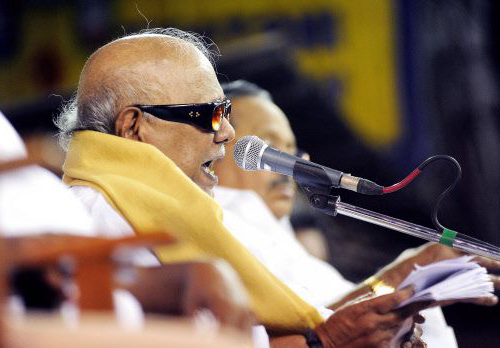
Chennai, September 26: Ahead of the Union cabinet reshuffle, the DMK, a key member of the ruling UPA, has declined Prime Minister Manmohan Singh's offer of two cabinet or a few minister of state berths for the party.
The PM on Tuesday despatched minister of state in the PMO V Narayanasamy to meet DMK chief M Karunanidhi and make the offer. But senior DMK leaders said Karunanidhi conveyed to the minister that he was at the moment not interested in recommending any party representative for inclusion in the Union cabinet. Narayanasamy met Karunanidhi at his CIT Colony residence in Chennai for about 30 minutes during which he discussed the PM's offer. After the exit of Mamata Banerjee's Trinamool Congress, which has 19 MPs, from the UPA, the DMK with 18 representatives in the Lok Sabha is the Congress' largest ally.
"Though our senior MPs wanted use the opportunity to get a good portfolio or two, Kalaignar (Karunanidhi) appears to be of a different view. He has been thinking about the stability of the government and it is one of the reasons for not accepting the offer," a senior DMK leader said. "Many of our district secretaries are against continuing with the alliance with the Congress. They have been expressing their views to Kalaignar and asking him to distance the party from the Congress," said a former state minister.
Senior DMK leaders point out that anger against the UPA government has been growing following a series of anti-people measures like fuel price hike and cap on subsidized LPG cylinders. "Such issues are also likely to cast a shadow on our prospects. The party wishes to keep its options open on alliances for the next Lok Sabha elections," the leader said.
DMK seniors also point out to Karunanidhi's recent statements and comments against the Centre. "We have been supporting the government as we have no other option. At the same time, we have started to maintain a distance from the Congress," said a party MP. Karunanidhi is probably keen to maintain the same strategy by declining to have more representatives in the Union cabinet. "If we accept the offer and get new portfolios, the parties in the state will target us even more. We don't want to damage our image further," the MP said.
But a section of Union ministers and MPs in the party feel that Karunanidhi should accept the offer and strengthen the party's presence in the Union cabinet. "When I suggested this view, Kalaignar pointed out that the present ministers themselves did not have any power, how will the new ones wield more power," he said.
The DMK got three cabinet and four MoS berths in the UPA2 when it came to power. After the resignation of A Raja and Dayanidhi Maran, M K Alagiri is the only cabinet-rank DMK minister in the Manmohan Singh ministry. S S Palanimanickam, S Gandhiselvan, S. Jagathratchagan and D Napoleon are ministers of state.





Comments
Add new comment